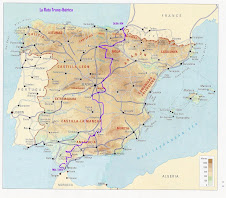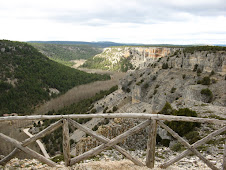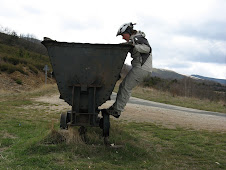One of the things that kept me riding (and sane) throughout the trip was my weekly chat with Roge Blasco. Roge is the host of two renowned radio shows about travel,
La Casa de las Palabras (The House of Words) and
Levando Anclas (Hoisting Anchor) on Radio Euskadi, the Basque regional broacasting network. At the end of every week, after 9:30 in the evening, we'd talk for ten or fifteen minutes about how the trip was going. No one in Spain is as up on the movements of travellers as Roge is: you name the means of transport or the country, he knows someone who's been there and done that, but there's always a note of enthusiasm and jealousy when he interviews you. It's like at any moment you expect him to say, "Gimme a couple of hours, and I'll be there..." and for him to slam down the phone and show up at your hotel before sundown.
Yesterday we did a taping for an edition of Levando Anclas which will be broadcast in July, and Roge brought up the fact that a lot of the problems that we had on the trip were weather-related. And I thought about something that I read last week, which makes all the more sense now that I've got some space to reflect on the trip.
CNN correspondent Anderson Cooper is the cover story on this month's edition of OUTSIDE magazine. He's been a reader of the magazine for decades, and was inspired by the article to take a trip across Africa when he was barely out of his teens, and from there went on to be one of the channel's best-travelled journalists. For copyright reasons I can't clip the particular question and answer that moved me, but if you click here(
http://outside.away.com/outside/culture/200805/anderson-cooper-2.html) and do a search for "It's supposed to suck", you'll see which one I mean.
It was a great relief to read this. It was a relief to see someone else say that it was all right if the trip didn't go perfectly, if the weather sucked or you realized that you were generally a lot happier when your travel companion went off on his own and you didn't see him for three days. It was all right to be awake at night, normally at 12:03 AM, obsessing about whether someone was going to steal your bike and leave you stranded in some lost town in Soria. (Funny, I never obsessed about breaking my neck - but the thought that someone would nick Ruby gave me more than one sleepless night.)
And Mr. Cooper is right. You learn a lot more about your own limits and your own sense of possibilities when things don't go perfectly. If you don't have adversity, you don't learn how strong you actually are, how resourceful you are and that
it's all right to be alone. A woman travelling alone is not an automatic target for all the evil and crime in the world. As women we receive messages, consciously or unconsciously, that if we go down into the woods today, we're going to end up dead in a ditch somewhere, that we're just asking to be raped or attacked or God knows what. (I should get my mother to fill this part in.) That doesn't mean that we shouldn't take precautions. But fear has limited value when undertaking something like this. If you're too fearful, everything is going to seem like a threat, rather than just crap that happens to everyone. You don't get bad weather because you're a woman travelling alone. You don't get pelted by hail because you're a woman travelling alone. Sometimes it is going to suck. You just can't take it personally. You shrug it off, you learn, and you keep your head down and keep going.ºººººººººººººººººººººººººººººººº
Roge Blasco's blog (in Spanish:)
http://blog.eitb.com/rogeblasco/
 Careful, my father said when I got back to Madrid. You're going to have a tough time readjusting to being back after being on the road for a while. And he was right. As difficult a challenge as it was, being back has been an even bigger challenge: there are times when I'll be on the bus or walking somewhere in the city, and I'll look up, and my mind will temporarily timeshift and I'll think, God, not so long ago I was riding up over there. I was free, on my bike for six weeks.
Careful, my father said when I got back to Madrid. You're going to have a tough time readjusting to being back after being on the road for a while. And he was right. As difficult a challenge as it was, being back has been an even bigger challenge: there are times when I'll be on the bus or walking somewhere in the city, and I'll look up, and my mind will temporarily timeshift and I'll think, God, not so long ago I was riding up over there. I was free, on my bike for six weeks. 





